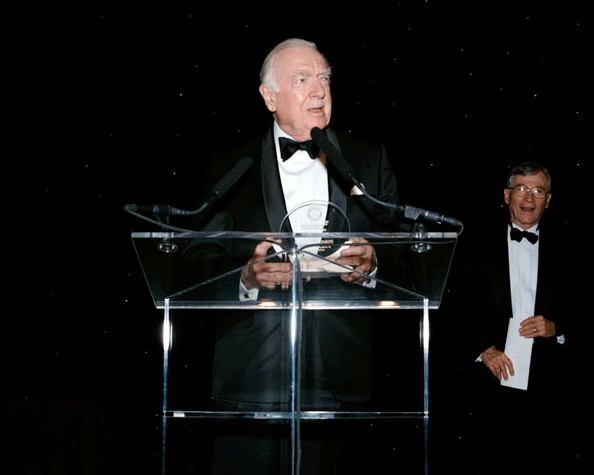1999 CORONA AWARD RECIPIENT
Walter Cronkite

Walter Cronkite
[Note: Profile as published in March 12, 1999 program book (author unknown). Mr. Cronkite died July 17, 2009.]
When Walter Cronkite speaks, people listen. His sign-off line on the CBS Evening News—"And that's the way it is...."—became part of the American culture, largely because his viewers knew that it was so. Cronkite and credibility are synonymous.
He has been selected to receive the Corona Award in recognition of a lifetime of achievement in space exploration. The award is made only when the RNASA board wishes to recognize unique contributions. It has been presented only twice before: to John Young, astronaut and Johnson Space Center associate director, in 1997 and to Dr. Robert Gilruth, former Manned Spacecraft Center director, in 1992.
Mr. Cronkite covered the top news stories of almost two generations during his more than 60 years in journalism—the last 49 affiliated with CBS News. He became a special correspondent for CBS News when he stepped down as anchorman and managing editor of the CBS Evening News after 19 years. Affectionately nicknamed "Old Iron Pants" for his unflappability under pressure, Mr. Cronkite has won acclaim and trust from journalism colleagues and the American public alike for his accomplishments both on the air and off.
He covered the space program from its beginnings. He reported to enthralled audiences the country's first tentative steps into space and the triumphs of the Apollo moon landings. He also reported on the STS-95 flight of Discovery in late 1998, which included John Glenn's second space mission.
Last November, in awarding Mr. Cronkite NASA's Distinguished Public Service Medal, the highest honor that the agency presents to a civilian, Administrator Daniel Goldin called Mr. Cronkite the nation's "eminent space reporter" and an American hero.
Born in St. Joseph, Mo., on Nov. 4, 1916, Mr. Cronkite grew up in Houston and began his career in journalism as a campus correspondent for The Houston Post during high school and his freshman year in college. He also worked as a sports announcer for a local radio station in Oklahoma City, then joined the United Press UP in 1937, where he remained for 11 years.
As an UP correspondent during World War II, Mr. Cronkite landed with allied troops in North Africa, covered the battle of the North Atlantic, took part in the Normandy beachhead assaults and was among the first newsmen to fly in B-17 raids over Germany. After the war, he was named UP bureau chief in Brussels and from 1946 to 1948 was chief correspondent for UP in Moscow.
In July 1950, Mr. Cronkite joined CBS News in Washington as a correspondent. He joined the CBS Evening News team on April 16, 1962. Its broadcast was only 15 minutes long. On Sept. 2, 1963, it became a network television's first half-hour weeknight news broadcast, a debut marked by Mr. Cronkite's headline-making interview with President John F. Kennedy.
After his departure from the CBS Evening News, he continued his association with the network, winning numerous awards for documentaries. He is an author and avid sailor; three of his books recount voyages on his 60-foot yacht, Wyntje. His 1996 autobiography is titled "A Reporter's Life."
In addition to his ongoing assignments as a special correspondent for CBS, Mr. Cronkite hosts public affairs and cultural programs for PBS and syndication. In 1993, he and former CBS colleague Jonathan Ward formed their own production company. Since that time, The Cronkite Ward Company has produced more than 25 award-winning documentary hours for The Discovery Channel, PBS and other networks.
